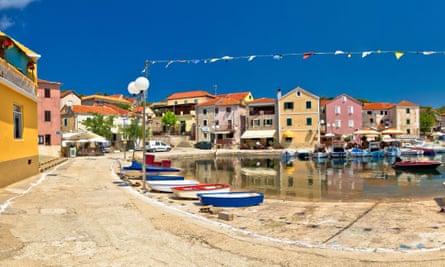- More from M-W
- To save this word, you'll need to log in. Log In

Definition of yacht
(Entry 1 of 2)
Definition of yacht (Entry 2 of 2)
intransitive verb
Examples of yacht in a Sentence
These examples are programmatically compiled from various online sources to illustrate current usage of the word 'yacht.' Any opinions expressed in the examples do not represent those of Merriam-Webster or its editors. Send us feedback about these examples.
Word History
obsolete Dutch jaght , from Middle Low German jacht , short for jachtschip , literally, hunting ship
1557, in the meaning defined above
1836, in the meaning defined above
Phrases Containing yacht
Articles related to yacht.

Why does English have so many silent...
Why does English have so many silent letters?
Inexplicable silent letters, explained
Words of the Week - March 4
The words that defined the week ending March 4th, 2022
Dictionary Entries Near yacht
yacht chair
Cite this Entry
“Yacht.” Merriam-Webster.com Dictionary , Merriam-Webster, https://www.merriam-webster.com/dictionary/yacht. Accessed 18 Apr. 2024.
Kids Definition
Kids definition of yacht.
Kids Definition of yacht (Entry 2 of 2)
from obsolete Dutch jaght (now jacht ), short for jachtschip, literally, "hunting ship"
More from Merriam-Webster on yacht
Thesaurus: All synonyms and antonyms for yacht
Nglish: Translation of yacht for Spanish Speakers
Britannica English: Translation of yacht for Arabic Speakers
Britannica.com: Encyclopedia article about yacht
Subscribe to America's largest dictionary and get thousands more definitions and advanced search—ad free!

Can you solve 4 words at once?
Word of the day.
See Definitions and Examples »
Get Word of the Day daily email!
Popular in Grammar & Usage
Your vs. you're: how to use them correctly, every letter is silent, sometimes: a-z list of examples, more commonly mispronounced words, how to use em dashes (—), en dashes (–) , and hyphens (-), absent letters that are heard anyway, popular in wordplay, a great big list of bread words, the words of the week - apr. 12, 10 scrabble words without any vowels, 12 more bird names that sound like insults (and sometimes are), 9 superb owl words, games & quizzes.

Scale your content creation with Strategically AI | Talk to us

Navigating the Spelling of Yacht: A Smooth Sailing Guide
The word "yacht" often raises eyebrows when it comes to spelling. This term, synonymous with luxury and leisure on the water, has a spelling that doesn't quite align with its pronunciation, leading many to second-guess themselves. In this article, we'll set sail through the correct spelling of "yacht," providing you with tips and examples to ensure that your writing journey is as smooth as a serene sea.
Understanding Yacht
A yacht is a type of boat or ship that is often used for pleasure, racing, or cruising. Originating from the Dutch word "jacht," which means "hunt," it was originally used to describe light, fast sailing vessels used to chase pirates. The transformation from "jacht" to "yacht" in English is where the spelling complexity lies.
The Spelling Challenge
The main challenge with "yacht" is its unorthodox spelling compared to its pronunciation. The 'ch' is silent, and there's no hint of the 't' in how it's spoken, which can lead to misspellings like "yatch," "yaght," or "yaht."
Tips for Spelling Yacht
- Remember the Dutch origin: The 'cht' is a common Dutch spelling.
- Silent 'ch': The 'ch' in yacht is not pronounced.
- End with 't': Despite not being pronounced, it's always there.
Examples in Context
Using "yacht" in sentences can help reinforce its correct spelling:
- They spent the weekend sailing on a luxury yacht.
- His dream was to circumnavigate the globe in a yacht.
Spelling Yacht Correctly
To ensure you always spell "yacht" correctly, consider these strategies:
- Link to Its Origin : Remembering its Dutch origin can help with the 'cht.'
- Visual Association : Associate the word with an image of a yacht, reinforcing the spelling.
- Create a Mnemonic : Think of "You Always Can Have Tea" (Y-A-C-H-T).
Summary and Key Insights
Remember, spelling "yacht" correctly is all about understanding its origin and unique spelling pattern. It's a word that might not follow the usual rules, but with a bit of practice, it becomes easy to handle.
Frequently Asked Questions
What is a common mistake when spelling "yacht".
A common mistake is spelling it as "yatch," reversing the 'a' and the 't.'
Can "yacht" refer to any boat?
No, a yacht specifically refers to a medium to large-sized boat used for leisure, racing, or cruising.
How can I easily remember the spelling of "yacht"?
Remember the silent 'ch' and the Dutch origin. A mnemonic like "You Always Can Have Tea" can also be helpful.
Why does "yacht" have a silent 'ch'?
The silent 'ch' in "yacht" comes from its Dutch origin, where such spellings are more common.
Is "yacht" spelled differently in other languages?
Yes, the spelling of "yacht" can vary in languages other than English, often aligning more closely with its pronunciation.
Mastering the spelling of "yacht" is like learning to navigate the high seas – it might seem daunting at first, but with the right knowledge and practice, it becomes second nature. Whether you're writing about maritime adventures or luxury travel, getting the spelling right is crucial. And for all your writing needs, from crafting engaging travel blogs to professional content, our expert content writing agency at Strategically is here to help, offering SEO content, unlimited revisions, and more to ensure your writing is as impressive as a sleek yacht gliding over the waves.
Scale your content creation with Strategically
Like this article spread the word, related articles.

Finity has a collection of latest 2,500 jobs to join next companies.
- For Talents
- For Companies
- Facebook Group
- Meet the Team
© Finity 2019, All Rights Reserved
Built with love by Grayic
- Daily Crossword
- Word Puzzle
- Word Finder
Word of the Day
- Synonym of the Day
- Word of the Year
- Language stories
- All featured
- Gender and sexuality
- All pop culture
- Grammar Coach ™
- Writing hub
- Grammar essentials
- Commonly confused
- All writing tips
- Pop culture
- Writing tips
Advertisement
- a vessel used for private cruising, racing, or other noncommercial purposes.
verb (used without object)
- to sail, voyage, or race in a yacht.
- a vessel propelled by sail or power, used esp for pleasure cruising, racing, etc
- See ice yacht , sand yacht short for sand yacht ice yacht
- intr to sail or cruise in a yacht
Discover More
Other words from.
- yachty adjective
- super·yacht noun
Word History and Origins
Origin of yacht 1
Compare Meanings
How does yacht compare to similar and commonly confused words? Explore the most common comparisons:
- yacht vs. sailboat
Example Sentences
As City News explained it, the bribes were paid not only in cash but through rugs, antiques, furniture, yacht club fees, boat repairs and more.
In Ashburn, Snyder is always lurking in spirit, even if he is on his 305-foot yacht somewhere in the Aegean.
Driving across country in a gigantic land yacht—with its crushed-velour seats and faux wood siding—was more practical than a two-door hot rod.
Host Jason Moore chats with experts who share tips harvested from their real-life experiences, such as a couple who paid off their $70,000 debt to travel full time and a woman who left her corporate job to work on a yacht.
Until Thursday, when federal agents escorted him off a 150-foot yacht moored in Long Island Sound, the word often used to describe Steve Bannon was “irrelevant.”
Instead the money allegedly was spent on luxury cars and a yacht club membership, among other things.
Loeb owns a $100 million penthouse on Central Park West and a $50 million yacht.
Solaire has set up charging capabilities at a project it built at a yacht club in Massachusetts, for example.
On my way back into town, I walked by the fortress of tents surrounding the harbor, readying for the yacht show.
Newly-minted Londoner, Lindsay Lohan, is currently chilling out on a yacht in Italy.
I heard her say to one of the servants once that my father had been lost on a yacht, and that he was oh, ever such a handsome man.
He owned a 54-ton yacht named the Opal, and attributed the wonderful health he enjoyed to his numerous sea voyages.
Another yacht had started from the old boathouse at about the time our friends and their new-fangled craft got under way.
Caermarthen ordered out his wonderful yacht, and hastened to complain to the King, who was then at Loo.
The yacht had long turned the head of the island and was beating down alongshore in the eastern bay.
Related Words
[ ak -s uh -lot-l ]
Start each day with the Word of the Day in your inbox!
By clicking "Sign Up", you are accepting Dictionary.com Terms & Conditions and Privacy Policies.
- 1.1 Etymology
- 1.2 Pronunciation
- 1.3.1 Derived terms
- 1.3.2 Translations
- 1.4.1 Translations
- 1.5 Anagrams
- 2.1 Etymology
- 2.2 Pronunciation
- 2.4 Further reading
- 3.1 Etymology
- 3.2 Pronunciation
- 3.4 References
- 3.5 Further reading
- 4.1 Etymology
- 5.1 Etymology
- 5.3 References
- 6.1 Etymology
- 6.3 References
- 7.1 Alternative forms
- 7.2 Etymology
- 7.3.1 Declension
- 7.3.2 Derived terms
- 7.4 Further reading
English [ edit ]
Etymology [ edit ]
Circa 1557; variant of yaught , earlier yeaghe ( “ light, fast-sailing ship ” ) , from Dutch jacht ( “ yacht; hunt ” ) , in older spelling jaght(e) , short for jaghtschip ( “ light sailing vessel, fast pirate ship ” , literally “ pursuit ship ” ) , compound of jacht and schip ( “ ship ” ) .
In the 16th century the Dutch built light, fast ships to chase the ships of pirates and smugglers from the coast. The ship was introduced to England in 1660 when the Dutch East India Company presented one to King Charles II, who used it as a pleasure boat, after which it was copied by British shipbuilders as a pleasure craft for wealthy gentlemen.
Pronunciation [ edit ]
- ( UK ) enPR : yŏt , IPA ( key ) : /jɒt/
- ( US ) enPR : yät , IPA ( key ) : /jɑːt/ , /jɑt/
- Rhymes: -ɒt
Noun [ edit ]
yacht ( plural yachts )
- 1897 December (indicated as 1898 ), Winston Churchill , chapter X, in The Celebrity: An Episode , New York, N.Y.: The Macmillan Company ; London: Macmillan & Co., Ltd. , →OCLC : The skipper Mr. Cooke had hired at Far Harbor was a God-fearing man with a luke warm interest in his new billet and employer, and had only been prevailed upon to take charge of the yacht after the offer of an emolument equal to half a year's sea pay of an ensign in the navy.
- 1907 August, Robert W[illiam] Chambers , chapter VI, in The Younger Set , New York, N.Y.: D. Appleton & Company , →OCLC : “I don’t mean all of your friends—only a small proportion—which, however, connects your circle with that deadly, idle, brainless bunch—the insolent chatterers at the opera, [ … ] , the chlorotic squatters on huge yachts , [ … ] , the neurotic victims of mental cirrhosis, the jewelled animals whose moral code is the code of the barnyard—!"
Derived terms [ edit ]
- motor yacht , motoryacht , MY
- sailing yacht , steam yacht , SY
- yacht person
Translations [ edit ]
Verb [ edit ].
yacht ( third-person singular simple present yachts , present participle yachting , simple past and past participle yachted )
- ( intransitive ) To sail , voyage , or race in a yacht .
Anagrams [ edit ]
- Cathy , tachy , tachy- , yatch
French [ edit ]
Borrowed from English yacht , from Dutch jacht .
- IPA ( key ) : /jɔt/ , /jot/ , ( Canada ) /jat/
yacht m ( plural yachts )
Further reading [ edit ]
- “ yacht ”, in Trésor de la langue française informatisé [ Digitized Treasury of the French Language ] , 2012 .
Italian [ edit ]
Unadapted borrowing from English yacht .
- IPA ( key ) : /ˈjɔt/ [1]
- Rhymes: -ɔt
yacht m ( invariable )
- the letter Y in the Italian spelling alphabet
References [ edit ]
- ^ yacht in Luciano Canepari , Dizionario di Pronuncia Italiana (DiPI)
- yacht in Treccani.it – Vocabolario Treccani on line , Istituto dell'Enciclopedia Italiana
Norman [ edit ]
Borrowed from English yacht .
yacht ? ( plural yachts )
- ( Jersey ) yacht
Norwegian Bokmål [ edit ]
From Dutch jacht , via English yacht .
yacht m ( definite singular yachten , indefinite plural yachter , definite plural yachtene )
- “yacht” in The Bokmål Dictionary .
Norwegian Nynorsk [ edit ]
yacht m ( definite singular yachten , indefinite plural yachtar , definite plural yachtane )
- “yacht” in The Nynorsk Dictionary .
Swedish [ edit ]
Alternative forms [ edit ].
yacht c
Declension [ edit ]
- yacht in Svenska Akademiens ordlista ( SAOL )
- yacht in Svensk ordbok ( SO )
- yacht in Svenska Akademiens ordbok ( SAOB )
- English terms derived from Dutch
- English 1-syllable words
- English terms with IPA pronunciation
- English terms with audio links
- Rhymes:English/ɒt
- Rhymes:English/ɒt/1 syllable
- English lemmas
- English nouns
- English countable nouns
- English terms with usage examples
- English terms with quotations
- English verbs
- English intransitive verbs
- en:Watercraft
- French terms borrowed from English
- French terms derived from English
- French terms derived from Dutch
- French 1-syllable words
- French terms with IPA pronunciation
- French terms with audio links
- French lemmas
- French nouns
- French countable nouns
- French masculine nouns
- fr:Watercraft
- French loanwords with irregular pronunciations
- Italian terms borrowed from English
- Italian unadapted borrowings from English
- Italian terms derived from English
- Italian 1-syllable words
- Italian terms with IPA pronunciation
- Rhymes:Italian/ɔt
- Rhymes:Italian/ɔt/1 syllable
- Italian lemmas
- Italian nouns
- Italian indeclinable nouns
- Italian countable nouns
- Italian terms spelled with Y
- Italian masculine nouns
- Norman terms borrowed from English
- Norman terms derived from English
- Norman lemmas
- Norman nouns
- Jersey Norman
- nrf:Watercraft
- Norwegian Bokmål terms derived from Dutch
- Norwegian Bokmål terms derived from English
- Norwegian Bokmål lemmas
- Norwegian Bokmål nouns
- Norwegian Bokmål terms spelled with C
- Norwegian Bokmål masculine nouns
- nb:Watercraft
- Norwegian Nynorsk terms derived from Dutch
- Norwegian Nynorsk terms derived from English
- Norwegian Nynorsk lemmas
- Norwegian Nynorsk nouns
- Norwegian Nynorsk terms spelled with C
- Norwegian Nynorsk masculine nouns
- nn:Watercraft
- Swedish terms borrowed from English
- Swedish terms derived from English
- Swedish lemmas
- Swedish nouns
- Swedish common-gender nouns
- sv:Watercraft
- English entries with topic categories using raw markup
- Mandarin terms with redundant transliterations
- Mongolian terms with redundant script codes
- French entries with language name categories using raw markup
- Requests for gender in Norman entries
Navigation menu
- Dictionaries home
- American English
- Collocations
- German-English
- Grammar home
- Practical English Usage
- Learn & Practise Grammar (Beta)
- Word Lists home
- My Word Lists
- Recent additions
- Resources home
- Text Checker
Definition of yacht noun from the Oxford Advanced Learner's Dictionary


Other results
- the Royal Yacht Squadron
- Royal Yacht Squadron
How To Spell yacht ?
How to pronounce yacht.
Correct pronunciation for the word "yacht" is [jˈɒt], [jˈɒt], [j_ˈɒ_t].
Definition of yacht
A swift-sailing, light, and elegantly furnished vessel, used either for private parties of pleasure, or as a vessel of state to convey princes, &c., from one place to another.
To sail in a yacht.
Nuttall's Standard dictionary of the English language By Nuttall, P.Austin
What are the misspellings for yacht?
What are similar-sounding words for yacht, what is the present tense of yacht.
- In the present tense, the personal forms of the verb " yacht " are:
- - You yacht
- - He yachts
- - She yachts
- - It yachts
- - They yacht
What is the past tense of Yacht?
- The personal forms of the verb " yacht " in the past tense are as follows:
- 1. I yachted
- 2. You yachted
- 3. He yachted
- 4. She yachted
- 5. It yachted
- 6. We yachted
- 7. You yachted
- 8. They yachted
What is the adverb for yacht?
The adverb form of the word "yacht" is "yachtingly" .
What is the adjective for yacht?
The adjective form of the word "yacht" is "yachting" .
Usage over time for yacht:
This graph shows how "yacht" have occurred between 1800 and 2008 in a corpus of English books.
What is the plural form of yacht?
The plural of the "yacht" can be the " yachts ".
What is the singular form of yacht?
The singular of the "yacht" can be the "yacht".
Synonyms for Yacht:
- aircraft carrier
- cabin cruiser
- fishing boat
Nearby words
- Yacca Podocarp
- yacht chair
- yacht clubs
- Correct spelling for yacht [Infographic] | Spellchecker.net
- yacht - English spelling dictionary
- Yacht | Definition of yacht by Merriam-Webster
- Yacht definition and meaning | Collins English Dictionary
- Yacht | Definition of yacht at Dictionary.com
- Yacht dictionary definition | yacht defined
Infographic

Add the infographic to your website:

Word of the day
Genus corozo.
- benus corozo
- fenus corozo
- g3nus corozo
- Spell Check in Excel
- Spell Check in Word
- Outlook Spell Check
- WordPad Spell Check
- Spell Check in PowerPoint
- Spell Check for Mac

Yacht or Yatch – Which is Correct?
- by Sarah Thompson
- March 4, 2024
Ah, the world of boats and sailing, where the wind carries you effortlessly over the sparkling blue waters. Whether you are a sailing enthusiast or just a curious observer, you might have come across some confusion regarding the spelling of the word “yacht.” Is it “yacht” or “yatch”? Let me clear up this perplexing matter once and for all.
The correct spelling is “yacht.” Yes, that’s right – the word is spelt with a ‘c’ in place of that tantalizing ‘t.’ It might seem counterintuitive, considering the pronunciation of the word, but trust me, it is the way to go. So why do so many people mistakenly spell it as “yatch”?
One possible reason for this common misspelling is that the combination of letters ‘acht’ in some languages, such as Dutch and German, is pronounced as ‘ackt.’ For instance, in German, ‘nacht’ is pronounced as ‘nackt.’ So, it is understandable that individuals with a background in these languages might confuse the spelling. However, in English, the ‘ach’ combination usually results in the ‘ack’ sound, as in ‘march’ or ‘attach.’
To further solidify the correct spelling, let’s dive into some examples:
1. “He sailed his sleek yacht across the Mediterranean.” Not “yatch” but “yacht.” This sentence showcases the proper spelling and usage of the word.
2. “My friend invited me to join him on his luxurious yacht for a weekend getaway.” Again, “yacht” is the correct spelling in this context.
3. “She dreamt of a life of elegance and glamour, cruising on a majestic yacht.” No “yatch” here either, just “yacht.”
Interestingly, the word “yacht” has its roots in the Dutch word “jacht,” meaning “hunt” or “chase.” Originally, yachts were vessels utilized by the Dutch navy to pursue pirates and engage in naval battles. However, over time, they morphed into the luxurious, pleasure-seeking vessels we associate with the word today.
These elegant boats are often associated with opulence, high society, and the leisurely lifestyles of the rich and famous. From James Bond’s suave adventures on the superyacht ‘Tiger Tanaka’ in “You Only Live Twice” to Jay-Z and Beyoncé’s extravagant yacht vacations, these vessels epitomize luxury and extravagance. So, it is important to get the spelling right when describing these vessels to maintain that air of sophistication.
In conclusion, the correct spelling of the word is “yacht.” Avoid the common mistake of spelling it as “yatch.” Remember, even though the pronunciation of the word may not match its spelling, the ‘c’ is necessary to maintain the correct form. So, next time you admire these magnificent sea-faring vessels, you can do so with confidence, knowing that you have mastered the spelling of “yacht.” Now, let’s set sail and explore the world of correct English spelling together!
Related Posts
Corrisponding or corresponding – which is correct.
- Correct Word
- March 1, 2024
Yacht or Yatch – Which is Correct? Ah, the world of boats and sailing, where the wind carries you effortlessly over the sparkling blue waters.… Read More » Yacht or Yatch – Which is Correct?
Surprise or Suprize – Which is Correct?
- March 3, 2024
Delicius or Delicious – Which is Correct?
Fruition or fruittion – which is correct.
- March 2, 2024
During or Durring – Which is Correct?
- March 5, 2024
Solely or Souly – Which is Correct?
Yacht or yacht?

Correct spelling

Incorrect spelling
✔ Click to open Free Grammar, Style and Spell Checker
Still not sure, leave a reply.
Your comment will appear after it has been approved (it takes usually up to 6 hours). If you have any questions or concerns please ask in the comment box and we will try to help!

Check other spellings » Click here to open our search engine...
This page is a spellcheck for word yacht . All Which is Correct spellings and definitions, including " Yacht or yacht " are based on official English dictionaries , which means you can browse our website with confidence! Common searches that lead to this page: how to spell yacht, correct spelling of yacht, how is yacht spelled, spell check yacht, how do you spell yacht.

How to Spell Yacht? (The Correct Way)

Have you ever wondered how to spell yacht? Yachts have become increasingly popular in recent years, and for good reason.
From their luxurious designs to the beauty of the open sea, yachts are a symbol of extravagance.
But before you can truly appreciate the majesty of a yacht, you need to know how to spell it.
In this article, we’ll explore the origin of the word ‘yacht’, different types of yachts, their advantages and disadvantages, and of course, how to spell yacht the correct way.
We’ll also answer some commonly asked questions about yachts and share some interesting facts about them.
So come aboard and let’s explore the wonderful world of yachts!.
Table of Contents
Short Answer
Yacht is spelled with an Y, an A, an C, and a H.
It is pronounced “yot”.
It is a type of recreational boat, usually large and luxurious, and is often used for recreational sailing and cruising.
Origin of the Word Yacht
The word yacht has an interesting origin story.
It comes from the Dutch word jacht, which means hunt.
The term was originally used to refer to a fast, light vessel that was used for hunting or fishing.
In the 17th century, Dutch shipbuilders began using the term to refer to large, luxurious vessels that were used for recreational sailing and cruising.
The term yacht was popularized in the 19th century by the British Royal Navy, who used it to describe their vessels.
Since then, the term has been used to refer to any recreational vessel that is used for sailing or cruising.
Today, yachts come in all shapes and sizes, ranging from small, single-person vessels to large, luxurious vessels that can accommodate dozens of people.
No matter what size yacht you have, its important to remember the correct spelling of the word: y-a-c-h-t.
With this spelling, youll never have to worry about making a spelling mistake when talking about your favorite recreational activity.
Different Types of Yachts

Yachts come in all shapes and sizes, from small, single-person dinghies to large, luxurious vessels that can accommodate dozens of people.
The most common types of yachts are motor yachts, sailing yachts , and catamarans.
Motor yachts are propelled by an internal combustion engine, while sailing yachts are propelled by the wind.
Catamarans are two-hulled vessels that are usually propelled by both the wind and a motor.
Cruising yachts are designed for long-distance travel, while racing yachts are designed for speed.
There are also luxury yachts, which are designed for comfort and style, and charter yachts, which are designed for private cruising.
No matter what type of yacht you choose, you can be sure that it will be an unforgettable experience.
Sailing Yachts
For those who are looking to take their love of sailing to a whole new level, a sailing yacht is the perfect vessel.
These large, luxurious vessels are designed to be able to traverse the open seas in style and comfort.
Yachts are typically much larger than dinghies or sailboats, and are often equipped with the latest in navigation and safety systems, as well as spacious cabins and amenities.
When it comes to choosing a sailing yacht, there are several factors to consider.
Size is one of the most important things to consider, as it will affect the length of your voyage and the number of people that can be accommodated on board.
Larger yachts tend to be able to hold more people and are more suitable for extended voyages.
The type of sailing yacht is also important.
There are a variety of different types of yachts on the market, from luxury sailing yachts to racing yachts.
Luxury yachts tend to be larger and more expensive, while racing yachts are usually smaller and more lightweight, designed for speed and agility.
Finally, when choosing a sailing yacht, you should also consider the materials used to construct it.
Yachts are typically made from either fiberglass or wood, both of which have their own advantages and disadvantages.
Fiberglass is generally considered to be the more durable material, while wood is typically more aesthetically pleasing.
No matter what type of sailing yacht you are looking for, the correct spelling of yacht is “y-a-c-h-t”, derived from the Dutch word “jacht”.
With the right research and preparation, you will be able to find the perfect sailing yacht for your needs.
Advantages and Disadvantages of Owning a Yacht

Owning a yacht can be a truly rewarding experience.
It can provide a sense of freedom and the ability to explore the world around you.
As with any major purchase, there are advantages and disadvantages to owning a yacht.
The primary advantage of owning a yacht is the opportunity to explore new places, from the open sea to the most remote islands and bays.
Yachts can provide a private escape from the hustle and bustle of everyday life, allowing for a sense of peace and relaxation.
With a yacht, you have the freedom to travel wherever you choose, and you can enjoy the comfort of your own home away from home.
However, owning a yacht can be a costly endeavor.
Yachts require a large initial investment, and they can also be expensive to maintain.
The cost of docking fees, fuel, and other maintenance costs can add up quickly.
In addition, yachts require a crew of trained professionals to keep them running safely and efficiently.
Yachts also require a significant amount of time and effort to operate.
From navigating to cleaning and maintaining the vessel, yacht owners must be willing to invest the necessary time and energy.
Finally, yachts may be subject to regulations that vary from port to port, making it important to plan ahead and be aware of the laws and regulations in different areas.
Overall, owning a yacht can be an incredibly rewarding experience, but it is important to consider all the advantages and disadvantages before making the decision to purchase one.
From the initial investment to the ongoing maintenance costs and time commitment, it is important to make sure that owning a yacht is something that you can comfortably commit to.
With the right preparation and knowledge, owning a yacht can be a wonderful way to explore the world.
How to Spell Yacht
When it comes to spelling the word yacht, its important to get it right.
A yacht is a luxurious vessel used for recreational sailing or cruising, and can range in size from small, single-person vessels to large, high-end vessels that can accommodate dozens of people.
Yacht is derived from the Dutch word jacht, which means hunt, and is often used to refer to a sailing vessel that is larger than a dinghy or sailboat.
The correct spelling of yacht is y-a-c-h-t, and it is important to remember that the letter y comes first.
The y in yacht is pronounced like a long e and is followed by the letter a, which is pronounced like a short a.
The c is pronounced like a k and is followed by the letter h, which is pronounced like a long a.
Finally, the letter t is pronounced like a short t.
When writing the word yacht, it is important to remember that the y comes first and is followed by the other letters in alphabetical order.
Additionally, it is important to remember that the letter y is pronounced like a long e and the letter a is pronounced like a short a.
Following these simple rules will ensure that you spell the word yacht correctly every time.
Commonly Asked Questions About Yachts

When it comes to yachting, there are many questions that arise.
Whether youre a novice sailor or a veteran of the open seas, its important to familiarize yourself with the basics of yachting to ensure a safe and enjoyable experience.
Here are some of the most commonly asked questions when it comes to yachts: 1.
What is a yacht? A yacht is a large, luxurious vessel that is typically used for recreational sailing or cruising.
Yachts come in a variety of sizes and can accommodate anywhere from a single person to dozens of passengers.
They are typically equipped with amenities such as cabins, galleys, and other recreational activities.
Yachts are typically powered by sails, although some may also be powered by engines.
What is the correct spelling of yacht? The correct spelling of yacht is y-a-c-h-t.
The word yacht is derived from the Dutch word jacht, which means hunt.
What is the difference between a yacht and a sailboat? The main difference between a yacht and a sailboat is size.
Yachts are typically larger than sailboats and usually have more amenities and features.
Yachts are also typically more expensive than sailboats.
Additionally, yachts are usually used for recreational purposes, while sailboats are typically used for racing or other competitive activities.
Interesting Facts About Yachts
Yachts are not just large, luxurious vessels used for leisurely sailing or cruising – they have a long and interesting history.
The term yacht is derived from the Dutch word jacht, which means hunt, and was originally used to refer to smaller, faster vessels used for hunting and fishing.
The first yachts were built in the 1600s in the Netherlands, and soon after, the English began building their own yachts.
Yachts have evolved since then and now come in a variety of sizes and styles.
Some of the most luxurious yachts have multiple decks and come equipped with amenities such as swimming pools, Jacuzzis, and even helipads.
Yachts can be powered by a variety of engines, from traditional diesel and gasoline engines to newer electric and hybrid systems.
In addition, they can be equipped with all the latest navigational and communication systems, allowing them to stay connected while out at sea.
Yachts are also a popular choice for racing, and various yacht racing organizations have sprung up all over the world.
Yachts also come in a variety of shapes and sizes, from the sleek and modern to the more traditional wooden vessels.
While most yachts are designed for leisurely sailing, some are designed for more extreme conditions, such as racing around the world or sailing in extreme conditions such as icy waters.
Overall, yachts are an interesting and varied type of vessel that have been used for a variety of purposes for centuries.
Whether youre looking for a leisurely sail or a more extreme sailing adventure, a yacht is a great way to get out on the open water.
Final Thoughts
Now that you know the correct way to spell yacht, you are well-equipped to answer any questions about yachting.
From its origin to the different types of yachts, and even advantages and disadvantages of owning one, you have a better understanding of the nautical world.
So go out and explore the seas in your very own yacht!.
James Frami
At the age of 15, he and four other friends from his neighborhood constructed their first boat. He has been sailing for almost 30 years and has a wealth of knowledge that he wants to share with others.
Recent Posts
Does Your Boat License Expire? Here's What You Need to Know
Are you a boat owner looking to stay up-to-date on your license requirements? If so, youve come to the right place! In this article, well cover everything you need to know about boat license...
How to Put Skins on Your Boat in Sea of Thieves? (Complete Guide)
There is a unique sense of pride and accomplishment when you show off a boat you customized to your exact specifications. With Sea of Thieves, you can customize your boat to make it look like your...

SailingEurope Blog - Sailing, Yacht Charter and Beyond

The Yacht – The Meaning and the Origin of the Word
In my language there are a few words for a floating object, or a vessel. According to the size and the purpose of the vessel, those words could be translated as “dinghy”, “yacht”, “boat” or “ship”. Some types of vessels have international names, for example “catamaran” or “hovercraft”.
What Does Yacht Mean?
However, when you say “ yacht” in my language, everyone know exactly what it is about. The word “yacht”, unlike other terms, has certain connotations. It always links with something classy, fancy, wealthy, elegant, and even glamorous.
For example, if you say that you have spent a week aboard a sailing boat , the recations of people will be more or less neutral. On the other hand, if you say that your week aboard a yacht was excellent, many people will become jealous. They will imagine you in a scene from a James Bond movie : aboard a massive white yacht in Monte Carlo , having a cold martini (shaken, not stirred)…
I wanted to share with you this language introduction because I found an interesting story about the word “yacht” and its origin. The word “yacht” became an English and an international term after an event that happened a long time ago.
How Do You Spell ‘Yacht’?

This word comes from the Dutch word “jacht”, which means “hunt”. Furthermore, “ j achtschepen” was the name for narrow, light and very fast sailing boats that the Dutchmen were using for intercepting larger and slower boats and ships.
One of the ‘hunters’ was given as a present to the British king Charles II . In His Majesty’s free time this vessel was not used for intercepting. Instead, was using it for fun. That is why the word “yacht” eventually became the term for vessels/boats made for pleasure.
I would highly appreciate comments from the native speakers of the English and Dutch languages. Especially since I am not one of them. No matter whether this story is true or not, it still sounds interesting to me.
Find out more about sailing quotes and phrases here .
I wish you a calm sea, a fine wind and a strong mast!
8 thoughts on “The Yacht – The Meaning and the Origin of the Word”
I looked up the origin of the word yacht, and it said it is a mid 16th century, Early Modern Dutch word from ‘jaght,’ from ‘jaghtschip’ meaning “fast pirate ship,” from ‘jaght’ which means “hunting” + ‘schip’ meaning “ship”.
I like the story of King Charles. It makes sense that that is why a yacht has the definite aura of wealth and pleasure!
Almost but not 100%. Actually the verb ‘jagen’ to hunt goes back to middle high German,i.e. Deutsch not Dutch, and before that it was ‘jagon’ in lower high German. But it seems that it all started with Greek and travelled North.
I guess that mid 16th century, the Dutch word jaght or jaghtschip was the word that got picked up. Not the earlier middle high German word where it came from.
Today it is jacht in Dutch, meaning hunting and it also the word for a luxury sailing boat.
In German Jagd is the word for hunt. Germans use the Dutch or English Jacht or Yacht for the boat.
Did the Germans design the original schooners? I think not! Since some Netherlanders speak a form of the Deutschland language, this word is shared (jacht/Dutch—jagd/German: meaning to hunt). It was the Dutch (Netherlanders) who designed the “flyut” or flute sailing ships, l-o-n-g before any British ever thought of such a ship—and—any German. The schooner grew out of the basic designs of the Dutch flute sailing ship (known for it’s speed). The Dutch economy relied heavily on trade and shipping, and were, thus, cutting edge innovators in ship building. Their engineering skills, was and is, plainly seen in their dike system, as well.
My father built a beautiful wooden replica of the”yacht” referred by the author (“Yacht Mary”) which was a present from the city of Amsterdam to King Charles II of England in 1660. They wrecked the ship a few years later (already too much partying on yachts, perhaps?)
I noticed the plaque that came with the model ship spelled the name as “Yatch” Mary. First, I thought, maybe, it was old English or Dutch spelling but it looks like it was just an error.
Nice, We have made an eplainermovie about this subject!
https://www.youtube.com/watch?v=l3HDZHF8w2E
In my head yogurt used to be spelled yoghurt and yacht used to be spelled yaught. Am I completely mis-remembering?
Dear Margaret, you are quite right for the spelling of the word yogurt that used to be, and sometimes still is, spelled with its old spelling yoghurt. However, there are no traces of the word yacht to have ever been spelled as yaught, but it would be best to take an etymology expert’s word for it.
Leave a Comment Cancel Reply
Your email address will not be published. Required fields are marked *
Save my name, email, and website in this browser for the next time I comment.
This site uses Akismet to reduce spam. Learn how your comment data is processed .
The Literacy Blog
Welcome to the literacy blog, a blog for teachers, parents, educational psychologists and educators interested in literacy..
The strange case of the word ‘yacht’
Share this:, sign-up to my newsletter.
Hi, my name's John Walker and I'm the director of Sounds-Write. By giving your email address and clicking on the link you receive in your email, you will receive a free sample of our ‘Help your child to read and write’ workbook and our monthly newsletter. We won’t pass your email address on to anybody else and you can unsubscribe at any time.
Email address:
6 thoughts on “ The strange case of the word ‘yacht’ ”
What serendipity!
Tonight I was reading to LittlePaperMover and the word yacht came up. I thought the word was fascinating from a SP point of view, and tried to work out the sound representations. (I am with your pupil's as i thought it was Y-a-cht, for the same reason they did. )!LittlePaperMover was incredibly unimpressed with the phonics lesson and put her head under the duvet and la-la-lahd until I shut up and got on with the story.
Tomorrow I shall tell her that not only is she an ungrateful small person but that yacht is a pirate word. She does love a pirate. She might learn how to spell yacht.
Hi Papermover, Serendipidous indeed! 'Yacht' is pretty low frequency I would have thought but it does have a habit of popping up in children's stories. If it appears in the middle of a bedtime story, I would definitely leave it until the following day to talk about. As a way of doing it, you might word build it, which would leave the spelling cht for /t/ until last – setting LittlePaperMover up for success. Then, when you've built the word, point to the a and say that it is /o/ as in words like 'was', 'swan', 'swallow', etc. When you point to the cht, you tell her that it's a one-off spelling of the sound /t/. And, then you can talk about derivation or pirates, a technique which is often a useful mnemonic. Similarly if it comes up in the middle of a lesson at school, where at KS2, for example, the focus would probably be on comprehension. The teacher should supply the word and return to it later or on the following day in a phonics session. Anyway, thanks for telling us about your experience. I look forward to some follow-ups.
You and I mean different things by “decodable”.
For me, a decodable word is one which can be read aloud (“decoded”) even if it has never been seen before. On this definition, yacht is not decodable.
Since you think yacht is decodable, you must have a different definition of “decodable”. What is it?
A second example: take the word fleury. A real word, but I expect you haven’t come across it before. The correct way of breaking it up is f l eu r y. But even though I have told you that, I don’t think you will be able to read it aloud correctly. That shows that it is not decodable (in my sense).
Best wishes,
Hi Max, We certainly do have different understandings of the word decodable. For you, 'a word is decodable if it can be read aloud even if it has never been seen before'. For a child in reception, the word 'vet' may not be decodable if, for example, the child has not yet been taught that v represents the sound /v/. So, the ability to decode partly depends on the level of code knowledge a child has. I say 'partly' because decoding ability also depends on the skills a person brings to their reading. Can they segment and blend proficiently enough to be able to use their code knowledge efficently? And then there's the question of a person's understanding of how the code works. So, do they understand that sounds can be spelled with more than one letter, that sounds can be spelled in (often) multiple ways, and do they also know that many spellings can represent different sounds? Given that all of these aspects of decoding have been well taught, I would fully expect some Y2 children and very many Y3 and above pupils to be able to decode 'yacht' successfully, although they may well baulk a little when it came to thinking about remembering how to spell it. That's where the teaching come in! I am also a little surprised you patronise me by assuming I wouldn't be familiar with the word 'fleury' or be able to read it. But, you know what, even if I hadn't been reading words like this since I was in primary school, I would almost certainly be able to decode the word because of the similarity with other spellings of /er/. Of course, it goes without saying that any pupil learning French would be able to handle it after learning 'travailleur', 'meilleur', or, perhaps, the more obvious 'fleur'.
I agree with you John … I like the first Y-ach-t and thought that straight away … probably because I am of the right age to be a big U2 fan. I'll tell my children about "Achtung Baby" to help them remember :).
Thanks again John for making English decodable …
Hmm. Actually, yacht isn't a "pirate ship" word, it's a "hunter of pirate ships" word. (Today's mega-yachts might be considered private pirate ships, but that too iw a whole nother story.)
The only stange thing about the word "yacht" is that it is considered a "strange case." Your first point is well-taken: The English language can easily incorporate pretty much any loan word from any language . This is a strength/asset of the language, not a weakness. It's what makes English the most widely used language in the world. However, there are a number of words, mostly personal and place names, whose Alphabetic Code correspondences follow the loan word history. So if the name of a city or person is written as Jaeger , it could be spoken as yayger, yogger, jayger, or jogger. And the pronunciation of the "er" would vary depending upon whether it was BritSpeak, YankSpeak, or some other Speak. The "assignment" of the correspondences is by convention, but the word is decodable whatever the convention, and once you know the convention, it's "no problem."
Had history gone differently, we could be writing "yacht" as "jacht," and if we are txtg, keying the word as "yot" is OK. The Correspondences are the link between the written and spoken language, but the action is in the Correspondences, not in the sounds or the symbols per se.
Your second point: having analysed the word in the way suggested above, children are far more likely to remember how to spell it in the future is arguable.
1. Some kids will have encountered the word in spoken or written communication and will be able to read it without any additional instruction. For those who can't, saying, "The pronunciation here is 'yot.'" is the the only " reading instruction" needed.
2. Kids are rarely going to have occasion to spell the word, and when they do, there are many alternative words they can use. "Ship" would work for them in most situations.
The nautical Technical Lexicon is large, and there is much more ambiguity in the definition of the word "yacht" than there is in its Alphabetic Code correspondences. Is a dinghy a yacht? How about a cruiser? Is a yacht a boat or a ship? These distinctions are relevant to composition instruction and to Thesaurus use, but they are unproductively redundant in reading instruction.
The broader point is that all English words are decodable. If a word isn't decodable, it's unintelligible. Fxjk is not decodable. F**k, though is decodable, given that you know some specific conventions beyond the Alphabetic Code. Those conventions are no more complicated than those entailed in punctuation marks, or in contractions, abbreviations, and wingdings. But if you haven't been taught the conventions, you will encounter difficulty in reading the text.
The standard definition of "decodable" can easily be checked by googling the term. (The definitions matches your definition.) However, there are "non-standard" definitions of "decodable, such as Max's. When the referents for the term are clear, as in this thread, there is "no problem." But there are big communication problems with non-standard terms in general and with the term "decodable" in particular. Few texts that are proffered as "decodable" actually conform to the standard definition.
Comments are closed.

Mastering the Art of Spelling: How to Spell "Yacht"
Introduction.
Correct spelling is an essential skill that is required in almost every aspect of life. From writing emails to filling out job applications, spelling errors can make a negative impression on the reader and even lead to misunderstandings. That's why it's important to master the art of spelling, starting with the word "yacht". The word "yacht" is a perfect example of a word that can be tricky to spell. It's a word that is commonly used in the context of luxury and leisure, often associated with sailing and boating. However, despite its popularity, many people struggle with spelling it correctly. In this blog post, we will explore the word "yacht" in detail, including its definition, origin, and common usage. We will also discuss the tricky parts of spelling "yacht", including the silent letters, and provide tips and techniques for mastering the spelling of this word. By the end of this post, you will not only be able to spell "yacht" correctly but also have a better understanding of the importance of correct spelling in general. So, let's dive in and start mastering the art of spelling!
Table of Content
Understanding the word "yacht", the tricky parts of spelling "yacht", techniques for spelling "yacht", other commonly misspelled words.
Spelling can be a tricky business, especially when it comes to words with silent letters. One such word is "yacht." To master the art of spelling this word, it's important to first understand what it means and how it's used. A yacht is a type of sailboat or motorboat that is used for leisure activities such as racing or cruising. The word "yacht" comes from the Dutch word "jacht," which means "hunt" or "chase." Originally, yachts were used by the Dutch navy to pursue pirates and other ships. Today, yachts are associated with luxury and wealth. They are often owned by wealthy individuals or used for corporate events and parties. Yachts can range in size from small, single-person boats to massive, multi-deck vessels with multiple cabins and amenities. Understanding the meaning and context of the word "yacht" can help with spelling it correctly. It's also important to note the silent letters in the word, specifically the "h" and the "t." These letters can be easy to overlook, but they are crucial to spelling the word correctly. In the next section, we'll discuss some tips and techniques for identifying and remembering silent letters in words, as well as common mistakes to avoid when spelling "yacht." With a little practice and attention to detail, anyone can master the art of spelling this tricky word.

Spelling can be a tricky business, especially when it comes to words with silent letters. "Yacht" is one such word that can trip up even the most seasoned speller. The silent letters in "yacht" are the "h" and the "t", which can make it difficult to remember the correct spelling. One tip for identifying and remembering silent letters in words is to look for patterns. For example, many words with silent letters have a French or Latin origin. In the case of "yacht", the word comes from the Dutch word "jacht", which means "hunt". Knowing the origin of the word can help you remember the spelling. Another technique for spelling "yacht" is to break the word down into smaller parts. The first three letters, "yac", can be remembered as "yak", like the animal. The last two letters, "ht", can be remembered as "height". Putting the two parts together, "yak-height", can help you remember the correct spelling of "yacht". It's also helpful to use mnemonic devices to remember tricky spellings. For example, you could create a sentence using the first letter of each word in "yacht", such as "Yellow apples can help teach". This sentence can help you remember the correct order of the letters in "yacht". Practice exercises can also be useful for improving spelling skills. You could try writing out the word "yacht" multiple times, or using it in a sentence. You could also try spelling other words with silent letters, such as "gnat" or "knight". By understanding the tricky parts of spelling "yacht" and using techniques such as breaking the word down into smaller parts and using mnemonic devices, you can master the art of spelling this tricky word. And by improving your spelling skills in general, you can communicate more effectively and confidently in both written and spoken language.

Spelling "yacht" correctly can be a challenge, but with the right techniques, it can become second nature. One effective technique is to break the word down into smaller parts. The word "yacht" has four letters, but it can be divided into two syllables: "yacht" and "ing". By breaking the word down into these smaller parts, it becomes easier to remember the correct spelling. Another technique is to use mnemonic devices. Mnemonic devices are memory aids that help us remember information. For example, you could create a sentence using the first letter of each word in "yacht". A possible sentence could be "Yellow apples can help teach". This sentence uses the first letter of each word in "yacht" and can help you remember the correct spelling. Practice exercises can also be helpful in mastering the spelling of "yacht". One exercise is to write the word "yacht" multiple times, paying close attention to the spelling of each letter. Another exercise is to write a sentence using the word "yacht" correctly. By practicing spelling "yacht" in different contexts, you can improve your spelling skills and make the correct spelling a habit. In addition to these techniques, it's important to remember that spelling is a skill that can be improved with practice. By paying attention to the spelling of words and using techniques like breaking words down into smaller parts and using mnemonic devices, you can become a better speller. And by improving your spelling skills, you can communicate more effectively and avoid embarrassing mistakes.

Spelling can be a tricky business, and "yacht" is just one example of a word that can trip people up. But there are many other words out there that are commonly misspelled, and it's important to be aware of them in order to improve your overall spelling skills. One common mistake is mixing up "there," "their," and "they're." "There" refers to a place or location, while "their" is a possessive pronoun indicating ownership. "They're" is a contraction of "they are." Another frequently misspelled word is "definitely" , which is often spelled as "definately" or "defiantly." Other commonly misspelled words include "accommodate" , "embarrass" , and "separate" . These words can be tricky because they have multiple consonants in a row or unusual vowel combinations. However, with practice and attention to detail, you can learn to spell them correctly. Improving your spelling skills can have a big impact on your writing and communication abilities. Not only will it help you avoid embarrassing mistakes, but it will also make your writing more professional and effective. There are many resources available for improving your spelling, including online courses, books, and apps. In addition to practicing specific words, there are also general tips you can follow to improve your spelling skills. For example, breaking words down into smaller parts can help you identify tricky letter combinations. Mnemonic devices, such as creating a memorable phrase or image to associate with a word, can also be helpful. Overall, while "yacht" may be a challenging word to spell, it's just one of many words that can trip people up. By paying attention to common spelling mistakes and practicing regularly, you can improve your spelling skills and become a more effective communicator.

In conclusion, mastering the art of spelling is an essential skill that can greatly impact one's communication and overall success. Correct spelling not only ensures that the intended message is conveyed accurately, but it also reflects positively on the writer's credibility and attention to detail. Specifically, learning how to spell "yacht" can be a challenging but rewarding task. By understanding the word's definition, origin, and common usage, individuals can gain a deeper appreciation for the language and its nuances. Additionally, identifying and remembering the silent letters in "yacht" can be achieved through various techniques such as breaking down the word into smaller parts and using mnemonic devices. Furthermore, improving spelling skills extends beyond just one word. There are many other commonly misspelled words that individuals can work on, and there are numerous resources available for further practice and learning. By consistently practicing and improving spelling skills, individuals can enhance their communication abilities and increase their chances of success in various aspects of life. In summary, mastering the art of spelling is a valuable skill that can greatly benefit individuals in both personal and professional settings. By taking the time to understand and practice spelling techniques, individuals can improve their communication and overall success. So, let's continue to strive for excellence in spelling and embrace the power of language.

About author
Related posts, can you wear rhodium plated jewelry in the shower, sparkling clean: can you use peroxide to clean your jewelry, what is miriam haskell jewelry worth.
- Entertainment
Most popular

- Cambridge Dictionary +Plus
English pronunciation of yacht
Your browser doesn't support HTML5 audio
(English pronunciations of yacht from the Cambridge Advanced Learner's Dictionary & Thesaurus and from the Cambridge Academic Content Dictionary , both sources © Cambridge University Press)

Word of the Day
have your hands full
to be so busy that you do not have time to do anything else

Binding, nailing, and gluing: talking about fastening things together

Learn more with +Plus
- Recent and Recommended {{#preferredDictionaries}} {{name}} {{/preferredDictionaries}}
- Definitions Clear explanations of natural written and spoken English English Learner’s Dictionary Essential British English Essential American English
- Grammar and thesaurus Usage explanations of natural written and spoken English Grammar Thesaurus
- Pronunciation British and American pronunciations with audio English Pronunciation
- English–Chinese (Simplified) Chinese (Simplified)–English
- English–Chinese (Traditional) Chinese (Traditional)–English
- English–Dutch Dutch–English
- English–French French–English
- English–German German–English
- English–Indonesian Indonesian–English
- English–Italian Italian–English
- English–Japanese Japanese–English
- English–Norwegian Norwegian–English
- English–Polish Polish–English
- English–Portuguese Portuguese–English
- English–Spanish Spanish–English
- English–Swedish Swedish–English
- Dictionary +Plus Word Lists
- All translations
Add ${headword} to one of your lists below, or create a new one.
{{message}}
Something went wrong.
There was a problem sending your report.
- International edition
- Australia edition
- Europe edition

Dalmatian spot: kicking back on Croatia’s Dugi Otok island
A fishing village stay on one of the country’s less-visited large islands reveals a quiet Adriatic gem boasting green lakes, holm oak forests, and unspoilt beaches
T he first thing that struck me about Luka was the silence. My wife, Caroline, and I had driven our rental car from Split north along the Croatian coast to Zadar and taken an hour-and-a-half ferry ride to the island of Dugi Otok. Then we had driven the island’s length southwards, through pine forest and scrub, to arrive at this tiny fishing village, where we would spend the next week. Both of us were slightly wired from driving on foreign roads. But the strange spell of Luka put an end to that.
Nothing moved, not even cats. Before us was a sheltered bay that seemed almost surreally smooth, undisturbed by the faintest breeze. Plaster flaked from the walls of crumbling fishing cottages, their gardens bright with flowering cactuses and bougainvillaea. A row of empty beer bottles outside the shuttered general store gave the deserted quay a Mary Celeste quality. Travelling in space can sometimes seem like travelling in time, and it felt as if we had stepped back to the 1950s. Dugi Otok (“Long Island”) is the most westerly of the Zadarian Islands off the Dalmatian coast, and one of the least-visited large islands in Croatia. Twenty-seven miles (44.5km) long and only three miles (4.8km) wide, the island’s slenderness makes it easy to explore, with a single road running from north to south. Its inhabitants – fewer than 1,500, many of whom leave in the winter months to escape the notorious Bora winds – are huddled on the eastern side, mostly in the “capital” Sali; the west falls away to steep cliffs and sand beaches. Cypress, pine, fig, olive and holm oak cover much of it, while the rest is blanketed in maquis, the scrubby evergreen underbrush of the Mediterranean. The plants comprising this dense weave are invariably spiked, hooked or barbed, as I learned the painful way when going off piste from a walking trail; the next few days were spent nursing lacerated legs. The maquis makes the island wild in a way I hadn’t encountered before, as swathes of uncultivated land are impenetrable to humans.

We rented an old fishing cottage in Luka (£62 a night) that had been in the owners’ family for years: tall and narrow, it had strong stone walls and a tiny balcony. Black-and-white photos gave an impression of their grandparents’ lives, fishing in the Adriatic through storms and bitter winters. The harbour was only steps away, and we befriended several cats in the restaurant on the quay, Konoba Zlata Vala, which served carafes of local wine and one of best risottos we had ever tasted.
A short drive south from Luka is the Telašćica nature park , around one of the largest natural harbours in the Adriatic. On the western edge of a narrow bay that cuts inland for six miles, elevated above the sea by 150-metre cliffs, is the saline Lake Mir (“Peace”), famed for its blue-green water. This is the island’s main tourist draw, as attested to by the yachts anchored in the bay below – snatches of boozy Italian and German drifted to us across the waves. But we spent most of the week seeking quieter corners. On Dugi Otok in September such a mission is not hard. The “only busy month” is August, according to our guesthouse hosts, and often we would find ourselves on near-empty beaches.

Our favourite was Veli Žal, half a mile of pebbles and sand bordered by thick greenery, along which previous castaways had constructed driftwood shelters. A mysterious craftsperson had whittled stick windmills, which spun rattling in the wind, a quirky generosity I found oddly moving. On afternoons when we didn’t feel like venturing far from home, the pebbly beach near Luka had its own scruffy charm. I was excited to meet a bright green praying mantis there, while the gloriously uninhibited older women sprawling naked on the rocks were a source of great admiration to Caroline. It reflected what we found to be an unbothered – and deeply relaxing – attitude among the islanders, and visitors, we encountered. Having said that, anti-nudity signs – a Ghostbusters-style bar across a cartoon pair of boobs – were displayed at Veli Rat, the lighthouse at the island’s northern tip. Islands are parochial. Things are different in the north.
Islands are also superstitious, refugia of myth. At the sea pool of Dragon’s Eye we found fossils in the rocks and in the cave of Strašna Peć – said to be created by fairies in an attempt to split the island at its narrowest point – deep time was recorded in dripping stalactites. Like many Adriatic islands, for centuries on the frontline of invasion from the Ottomans, Dugi Otok also has its share of pirate stories. These coasts were once haunted by the Uskoks, Croatian sea bandits used as proxy forces by the Hapsburg empire, who wreaked havoc on Venetian and Turkish fleets.
after newsletter promotion

The best way to know islands, of course, is from the sea. On our penultimate day, a skipper steered us in a boat southwards out of Sali and through Telašćica bay into an archipelago that felt like another world (private half-day boat tours with Adamo Travel cost £128). The Kornati national park consists of 89 islands and islets scattered across eight miles south-east of Dugi Otok. They are starkly different from the forested place we’d just left, banded with karst rock formations like gigantic ammonites, yellow and desolate, looking – as our skipper said – “like Arabia or Iran”. A century ago, the Kornati Islands were purchased from the aristocrats of Zadar by peasant farmers for grazing sheep, which ate everything in sight. Most are uninhabited, apart from the hardiest souls; summers here are scorching and the winter winds are brutal. The isolation and wildness reflect an antiauthoritarian streak that goes back hundreds of years: when the ruling Austrians came to record the islands’ names, the local people gleefully told them that one was named Babina Guzica (“Grandmother’s Arse”) and another Kurba Vela (“Great Whore”). Happily, both those islands bear these names today.

As we returned to Dugi Otok, relieved by the sight of trees again, Caroline pointed out a sheep dozing on a headland. Our skipper said this matted beast was something of a celebrity, an escaper from a nearby island that had swum the narrow strait and successfully evaded recapture for 10 years. Her pursuers have long since given up; the sheep has won her freedom. In November 2023, a stranded sheep in Scotland was “rescued” and taken to a petting zoo, and was later used to front a rural loneliness campaign. In Dugi Otok, this proud loner is left to her own feral life, sunning herself beside some of the cleanest waters in the Mediterranean. The naked older ladies would approve. It perfectly encapsulates the spirit of the island.
- Croatia holidays
- Europe holidays
- Beach holidays
Most viewed

IMAGES
VIDEO
COMMENTS
yacht: [noun] any of various recreational watercraft: such as. a sailboat used for racing. a large usually motor-driven craft used for pleasure cruising.
YACHT definition: 1. a boat with sails and sometimes an engine, used for either racing or travelling on for pleasure…. Learn more.
Spelling Yacht Correctly. To ensure you always spell "yacht" correctly, consider these strategies: Link to Its Origin: Remembering its Dutch origin can help with the 'cht.'. Visual Association: Associate the word with an image of a yacht, reinforcing the spelling. Create a Mnemonic: Think of "You Always Can Have Tea" (Y-A-C-H-T).
The proper spelling of the word is "yacht". "Yatch" is an incorrect spelling of the word and should not be used. A yacht is a recreational boat or ship that is used for leisure activities such as cruising, racing, or sailing. It is often associated with luxury and is typically owned by wealthy individuals.
YACHT meaning: 1. a boat with sails and sometimes an engine, used for either racing or travelling on for pleasure…. Learn more.
Yacht definition: a vessel used for private cruising, racing, or other noncommercial purposes. See examples of YACHT used in a sentence.
yacht. Correct spelling, explanation: this word comes from the Dutch word jacht, which means hunt. It's sail- or power-driven vessel, used for racing or for recreation. As you can see, the English spelling is similar to the Dutch one - only -j changes to -y. That's why the only correct form is yacht, not yatch. noun, a medium-sized ...
Having difficulty spelling yacht? Check out Ginger's spelling book and learn how to spell yacht correctly, its definition and how to use it in a sentence! ... they sailed away on their yacht and lived happily ever after Other users have misspelled yacht as: yact - 5.7%; yaght - 3.4%; Other - 90.8%; Other misspelled words. vacuum. efficient.
A yacht Etymology [edit]. Circa 1557; variant of yaught, earlier yeaghe (" light, fast-sailing ship "), from Dutch jacht (" yacht; hunt "), in older spelling jaght(e), short for jaghtschip (" light sailing vessel, fast pirate ship ", literally " pursuit ship "), compound of jacht and schip (" ship ").. In the 16th century the Dutch built light, fast ships to chase the ships ...
a sailing boat, often also with an engine and a place to sleep on board, used for pleasure trips and racing. a 12-metre racing yacht; a yacht club/race; compare dinghy Topics Transport by water b2, Sports: water sports b2
Yacht or Yatch are two words that are confused and usually misspelled due to their similarity. Check which one to use! Grammar Word Lists Word Finders GET THE APP WordTips; Misspellings; Yacht or Yatch; Yatch or yacht Did you mean "yacht"? INCORRECT Yatch. CORRECT Yacht. Yacht Noun. Definition: ...
The brochure would likely use the correct spelling "yacht" to describe the boats participating in the event, such as "The world's finest yachts will be racing against each other." It is worth noting that common misspellings such as "yatch" or "yeacht" may occur due to the "ch" sound in "yacht."
Definition of yacht. A swift-sailing, light, and elegantly furnished vessel, used either for private parties of pleasure, or as a vessel of state to convey princes, &c., from one place to another. To sail in a yacht. Nuttall's Standard dictionary of the English language By Nuttall, P.Austin.
Not "yatch" but "yacht." This sentence showcases the proper spelling and usage of the word. 2. "My friend invited me to join him on his luxurious yacht for a weekend getaway." Again, "yacht" is the correct spelling in this context. 3. "She dreamt of a life of elegance and glamour, cruising on a majestic yacht."
This page is a spellcheck for word yacht.All Which is Correct spellings and definitions, including "Yacht or yacht" are based on official English dictionaries, which means you can browse our website with confidence!Common searches that lead to this page: how to spell yacht, correct spelling of yacht, how is yacht spelled, spell check yacht, how do you spell yacht.
Yachts come in all shapes and sizes, from small, single-person dinghies to large, luxurious vessels that can accommodate dozens of people. The most common types of yachts are motor yachts, sailing yachts, and catamarans. Motor yachts are propelled by an internal combustion engine, while sailing yachts are propelled by the wind.
How Do You Spell 'Yacht'? This word comes from the Dutch word "jacht", which means "hunt". Furthermore, " jachtschepen" was the name for narrow, light and very fast sailing boats that the Dutchmen were using for intercepting larger and slower boats and ships. One of the 'hunters' was given as a present to the British king ...
April 17, 2015 John. The strange case of the word 'yacht'. This old chestnut comes up on a fairly regular basis and is cited as an example of how not all English words are decodable. In truth, the word presents us with more of a challenge than many others. However, holding to the notion that every word incorporated into the English language ...
Spelling "yacht" correctly can be a challenge, but with the right techniques, it can become second nature. One effective technique is to break the word down into smaller parts. The word "yacht" has four letters, but it can be divided into two syllables: "yacht" and "ing". By breaking the word down into these smaller parts, it becomes easier to ...
Yacht. Noun. Definition: A sailing boat equipped for cruising or racing. Examples: He bought a yacht and taught himself to sail. A yacht club.
YACHT pronunciation. How to say yacht. Listen to the audio pronunciation in English. Learn more.
This video shows you how to pronounce Yacht (yachting, pronunciation guide).Learn to say PROBLEMATIC WORDS better: https://www.youtube.com/watch?v=dyncGi5eWz...
This is the island's main tourist draw, as attested to by the yachts anchored in the bay below - snatches of boozy Italian and German drifted to us across the waves. But we spent most of the ...